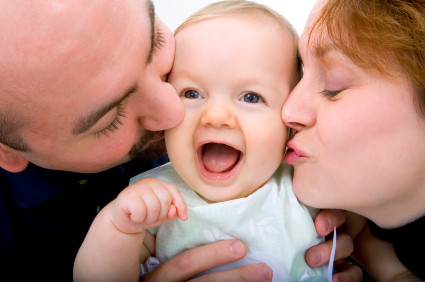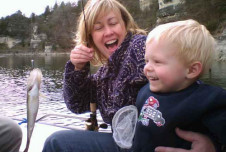I recently read happiness blogger Gretchen Rubin’s interview with Laura Vanderkam, author of the new book 168 Hours: You Have More Time Than You Think. I was particularly struck by this statement by Vanderkam: “I wish people wouldn’t say ‘I don’t have time to do X, Y or Z.’ Instead, we should say ‘I won’t do X, Y or Z because it’s not a priority.’”
This got me wondering: When I elect to work late, am I sending the message to my kids that they’re less of a priority to me than my job? I won’t spend time with you tonight, honey, because, frankly, my work is more important.

Sometimes our work has to be more important. We don’t want to starve, right? But other times, well, it’s not so clear—our choices might be guided less by necessity than by a lack of discipline or perhaps, yes, misplaced priorities.
I know the whole quality vs. quantity time thing is a working-parent cliché. But this debate persists in my mind —is a wee bit of “quality time” good enough?—a decade after it began for me. How much work is too much? Is it vain to think that more time with me is better? How much time do my kids really need at home with me—and would some of this time be better spent in a dance class or playing soccer or just running around in the yard while I type away on my laptop? How does this change as kids get older? I just had lunch with a mom who quit work for the first time since she had children – because she felt her teenagers needed more time with her. Isn’t that when they are supposed to be more independent?
When I was in graduate school—and had an infant and toddler—I was deeply reassured by Ellen Galinsky’s 1999 book Ask the Children: The Breakthrough Study that Reveals How to Succeed at Work and Parenting. The vast majority of kids in her study, third through twelfth graders, didn’t wish for more time with their working parents. Instead, about a third of them wished that their parents, particularly their mothers, would be less tired and stressed by work.
As I reread the study now, several other findings strike me as still-very-useful for parents grappling with how much time to spend with their children, whether or not they are working outside of the home.
(1) Don’t rush kids. Children are far more likely to say their parents make them “feel important and loved” if their time with them is calm and unhurried. (Dang. This isn’t my strength.)
(2) Quantity matters. The fact that most kids don’t wish for more time with their parents means that most parents are already getting this right. But let’s not kid ourselves: “Children who spend more time with their mothers and fathers on workdays and nonworkdays grade their parents higher, feel their parents are more successful at managing work and family responsibilities, and see their parents as putting their families first,” writes Galinsky.
(3) Focus is the most important thing. I’ll just let Galinsky say it: “When children feel that their mothers and fathers can focus on them, they are much more likely to feel that their parents manage their work and family responsibilities successfully and put their families before their work, and they give their parents much higher marks for all of the parenting skills we examined. Although very few children believe that their parents have trouble paying attention to them, those who do see their mothers and their fathers in an extremely negative light.”
This focus thing—which I see as being present—is the bull’s eye, the sweet spot of parenting. Sure, kids need time to just hang around with us while we check our email or cook dinner and they read or do their homework. But they also need us to focus on them a little bit each day, to be totally present with them. Dan Siegel, MD and author of Mindsight, explains why:
When parents and children align their focus on each other, there is a neurobiological process…that is activated. This process, which mediates a sense of well-being, joy and elation, is at the heart of emotional attunement when one person feels “felt” and understood by the other person. This form of contingent communication is at the heart of developing secure attachments. It begins in infancy and continues throughout the life span.
This presence, this focus, is what really matters. It does require a quantity of time to be present. And this presence makes for very high quality time.
Easier said than done. But this is the heart of mindful parenting, and it allows us to stop judging ourselves. When we parent mindfully, we are simply taking in what is in the here and now, without judgment. We are aware of our own moods, and those of our children. We cease our relentless planning and our relentless doing.
This means, for me, that I need to stop multi-tasking with my kids. I am always doing something; actually, usually I’m both doing AND planning for the next thing. Which means I’m not focused. There is the egregious not-present, as when during our family dinner I’m checking something else off my list: I wolf my food down, then bring a stack of mail to open while my slow-eating-children finish.
There is also the subtle-not-focused: When walking the kids back from the park, I keep telling them to pipe down so that I can hear my own thoughts. I want the space to worry about whatever I’m working out in my head, without the bickering masses bugging me. If I were focused and present, I’d use the time for a moment of play, or at the very least, a moment of mindfulness.
This all brings me back to the very important idea of how happiness is related to the “non-instrumental” activities in our lives, those things we do for no reason other than our own enjoyment. I’ve blogged before about how a life without “non-instrumental” activities is a life full of anxiety and devoid of joy. Turns out that parenting is the same: When our parenting is all instrumental—just accomplishing what needs to get done—we risk not just our own but our children’s happiness.
What do you need to do to be able to focus on your children more easily? What times of the day does this come without effort? (For me, it is bedtime. I love to read with my children.) What small, turtle-step towards change can you make toward parenting more mindfully?
Key Reference:
Galinsky, Ellen, 1999. Ask the Children: The Breakthrough Study That Reveals How to Succeed at Work and Parenting (New York: Quill)
What’s Happening on the Raising Happiness Blog?
Some readers are “appalled” by my admission that I let my kids mix music using ToonsTunes rather than giving them formal music lessons. Join the discussion here.
The blog is growing! Thanks to the generous support of Lee Hwang and his Quality of Life Foundation, I am going to be able to post more frequently and make this blog even better. Here are the features I’m hoping to post to 3 or 4 times per month:
Walking the Talk
Real life parenting informed by the latest research. Short posts about how I’m trying to integrate what I’ve learned from science into my own family.
The Main Dish
This is where I take on a bigger topic, and look at several studies that have implications for how parents can raise happy, confident, and resilient children. I took a break from this feature over the summer, but it’s back!
My New Podcast, Happiness Matters!
Whoo-hooo!!! I am SO EXCITED (can you tell?) about this new podcast I’m doing with Rona Renner, long-time parent educator and all-around wonderful human being. I have long looked for a working-mom mentor, and for me, Rona is it. The mother of four and grandmother of two, and the founder and host of the radio show Childhood Matters, Rona goes through life with strength, wisdom, and grace. It is my true honor and pleasure to record these podcasts with her. Please go subscribe to it through iTunes!
(If you don’t listen to podcasts yet, you might want to try this. My favorite podcasts make folding laundry something I look forward to. Lifelong learning at its best!)
Remember Friday Photos? We are bringing them back, with a twist. This is going to be our community gratitude journal. Watch for this feature on Fridays, and PLEASE CONTRIBUTE!
As the Raising Happiness blog grows, what else would you like to see here? What questions do you have about parenting?
OTHER NEWS
Have You Heard About the Raising Happiness Class? I hope so. If you’d like a little more guidance putting all that I write about in this blog and my book into practice, I hope you’ll consider taking my class online (or live if you live in the Bay Area). Registrants receive a free copy of Raising Happiness, and if you take the class with a friend, I’ll donate money back to your kids’ school.
Speaking Engagements…even if you aren’t taking my live parenting class, I’d still like to meet you! Check out my speaking engagement schedule here on my personal website or here on the Greater Good Science Center Calendar.
Science of a Meaningful Life Seminars. The Greater Good Science Center’s event series has an amazing lineup this fall. Our October 22 seminar in Berkeley will be led by Robert Emmons and Rick Hanson, who’ll teach how and why to build gratitude—just in time for Thanksgiving! In November we’re having our first-ever seminar in Seattle, featuring the GGSC’s Dacher Keltner and John Gottman, the nation’s top scientific authority on marriage and parenting. And in December, Dacher will be back in Berkeley, joined by Mary Gordon, founder of the trailblazing Roots of Empathy program, to explore how to teach compassion and empathy to kids (and adults).





Comments